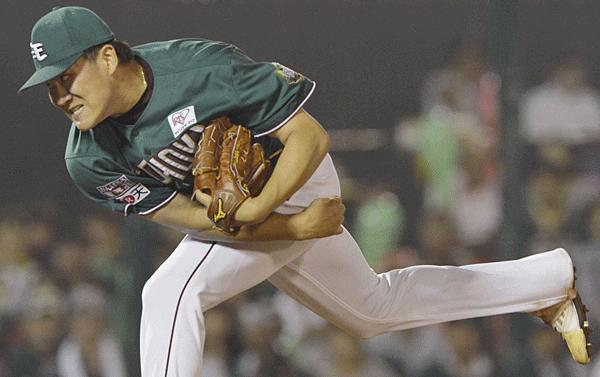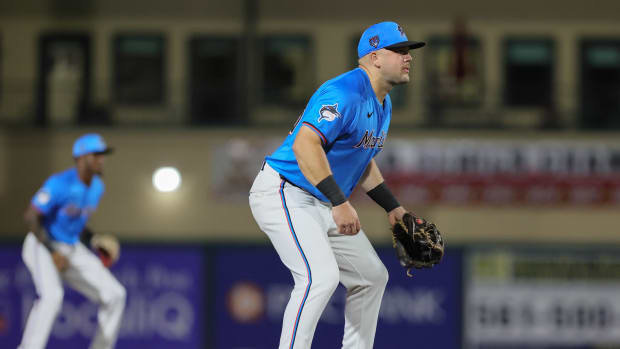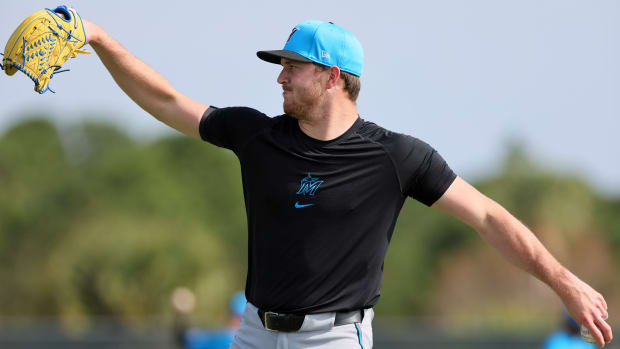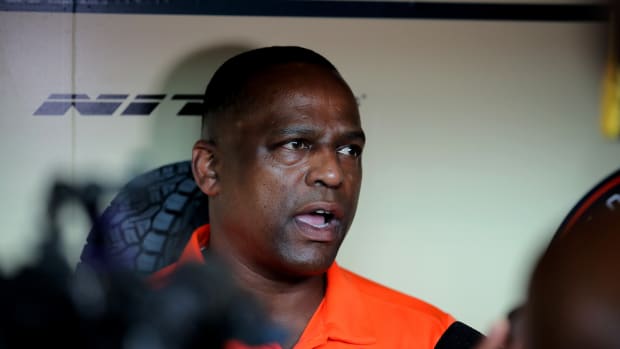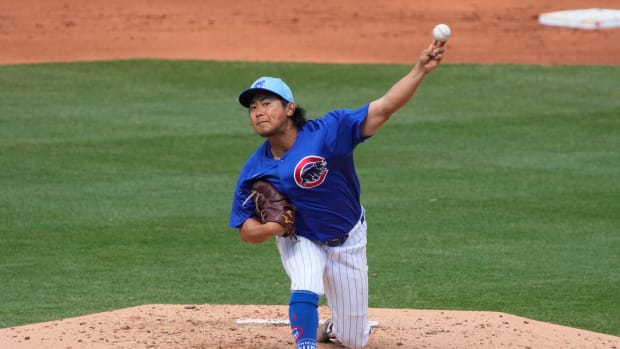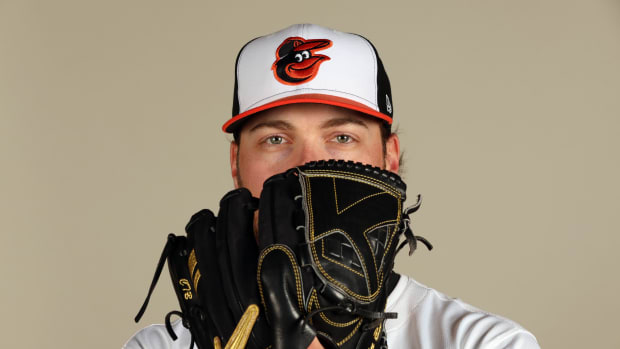Yankees blow past luxury tax to get much-needed Masahiro Tanaka
The Yankees have a seven-year, $155 million deal with Japanese righty Masahiro Tanaka. (Kyoto/Landov)
Masahiro Tanaka will wear pinstripes. The 25-year-old Japanese righty has agreed to a seven-year deal with the Yankees worth $155 million, with an opt-out clause that allows him to re-enter the market after four years. That price tag doesn't include the $20 million posting fee that the Yankees will pay to the Rakuten Golden Eagles, his former team in Japan's Pacific League. It's a huge expenditure, one that shores up New York's most glaring weakness at the expense of undoing its previous austerity effort.
The new posting rules put in place last month worked to Tanaka's advantage by ensuring that a larger share of the major league team's total outlay wound up in his pocket rather than his former team's. Under the previous blind auction system, one team won exclusive negotiation rights for 30 days and paid a large fee to the Japanese club. Under the new rules, the posting fee is capped at $20 million while allowing any team willing to meet that figure to negotiate within the 30-day window, which would have ended Friday at 5 p.m. ET; five other teams besides the Yankees (the Dodgers, Diamondbacks, Cubs, White Sox and Astros) were reported to have made offers. By comparison, the Red Sox bid $51,111,111 for the right to sign Daisuke Matsuzaka to a six-year, $52 million deal back in November 2006, and the Rangers bid $51,703,411 for the right to sign Yu Darvish to a six-year, $56 million deal in December 2011.
Relative to those two pitchers, Tanaka additionally benefited from four other factors that helped push his contract to the largest ever by a Japanese player:
• The influx of additional television rights revenue from MLB's national broadcast agreements with ESPN, Fox and TBS that will bring $1.5 billion into the game from 2014-2021, $25 million more per team per year than the old agreement.
• The deep pockets of the Yankees, who only recently have been challenged by the Dodgers as the game's top-spending team.
• New York's desperation after missing the playoffs for just the second time since the 1994 players' strike -- and watching the division-rival Red Sox win their third World Series of the last 10 years.
• The comparative weakness of the Yankees' rotation, which was returning just two pitchers who made more than 20 major league starts in 2013.
Among pitchers, Tanaka's deal ranks as the fifth-highest in history, behind those of Clayton Kershaw (seven years, $215 million), Justin Verlander (seven years, $180 million), Felix Hernandez (seven years, $175 million) and new teammate CC Sabathia (seven years, $161 million). In terms of average annual value, however, Tanaka's $22.14 million per year is the 10th-highest ever for a pitcher, according to Cot's Contracts:
Rank | Pitcher | Team | Years | AAV ($ million) |
1 | Dodgers | 2014-2020 | $30.7 | |
2 | 2013-2019 | $25.7 | ||
3 | Felix Hernandez | 2013-2019 | $25.0 | |
4 | Dodgers | 2013-2018 | $24.5 | |
5 | CC Sabathia | Yankees | 2012-2016 | $24.4 |
6T | 2013-2018 | $24.0 | ||
Phillies | 2011-2015 | $24.0 | ||
8 | CC Sabathia | Yankees | 2009-2015 | $23.0 |
9 | 2008-2013 | $22.9 | ||
10 | Masahiro Tanaka | Yankees | 2014-2020 | $22.1 |
Sabathia is on the list twice because he exercised his original opt-out clause after three years, a move that netted him an additional year at $25 million plus a $25 million vesting option with a $5 million buyout for 2017. Such clauses are becoming increasingly common among this elite group; Kershaw has one after five years, Greinke after three. Not coincidentally, those two deals as well as Tanaka's were all done by agent Casey Close, who is now potentially set up to bring Greinke back on the market after the 2015 season, Tanaka after the 2017 season and Kershaw after the 2018 season.
The $175 million total package (the contract plus the posting fee) over seven years is believed to be the same amount that the Yankees offered to Robinson Cano, who rejected that deal and instead signed a 10-year, $240 million contract with the Mariners. Speaking of Seattle, this package matches what the M's are paying Hernandez from 2013-19.
But for all of that money and the eye-popping statistics that Tanaka has put up in Japan — he went 24-0 with a 1.27 ERA and 5.7 strikeout-to-walk ratio in 2013, and owns a career 2.30 ERA and 4.5 strikeout-to-walk ratio through seven seasons — nobody knows exactly how his stuff will translate stateside. He's less of a power pitcher than Darvish, who is three inches taller (6-foot-5 to Tanaka's 6-2), and Tanaka may lack the upside of a true ace.
CHEN: Better than Yu? Tanaka gets mixed reviews from scouts
Here's what pitching mechanics expert Doug Thorburn had to say about Tanaka's arsenal at Baseball Prospectus, while offering several GIFs of his pitches:
Tanaka’s stuff is legit, with a fastball that sits 90-92 mph but spikes to 96, a sharp breaking ball, and a splitter that disappears late on its path to the plate. He uses both the four- and two-seam varieties of the fastball with good movement and plus command, according to scouting reports as well as the limited footage available. His breaker has earned a slider label, though the velocity and trajectory of the pitch suggest a curve; semantics aside, his high-frequency usage of the pitch adds to the workload-related concerns with respect to his health. The best pitch in Tanaka's arsenal is probably the splitter, which features arm-side run in addition to the trademark drop, and the fastball arm action adds to the deception of the split.
Thorburn was less sanguine about Tanaka's mechanics, noting the pause from the windup that is typical from Japanese pitchers and which can play havoc with hitters' timing but also exacerbate some of his other shortcomings and hinder his attempts to repeat his delivery: "[T]he combination of inconsistent momentum, wavering balance, and drifting posture is a bad omen for Tanaka's chances of sustaining the walk rates [1.4 per nine in 2013, and 1.9 per nine career] that have distinguished his statistical record in Japan."
Also of concern is Tanaka's workload. He broke into the Pacific League at just 18 years of age and threw a total of 359 innings in his age-18 and -19 seasons. He's averaged 188 innings per year in the shorter (140-game) Japanese season, topping 200 innings just twice (including 212 in 2013) but averaging nearly eight innings per turn. What's more, his 113.3 pitches per start over the last five years is more than any major leaguer in that timespan (Justin Verlander is first at 112.9. Via Yahoo! Sports' Jeff Passan, Tanaka topped 140 pitches three times in that span and went 130 or more in 15 of his 123 starts. In the Japan Series in early November, he threw 160 pitches in a complete-game loss in Game 6, then returned to throw 15 in relief to get the save in Game 7.
The Yankees are obviously willing to take the risk that comes with such a workload, largely because their rotation is so precarious in the wake of Andy Pettitte's retirement and Phil Hughes' departure via free agency. Sabathia is coming off a career-worst 4.78 ERA and offseason surgery to remove bone spur in his elbow. Hiroki Kuroda, whom the team re-signed to a one-year, $16 million deal, turns 39 on Feb. 10. Those two pitchers are the only ones in the rotation who made more than 20 major league starts in 2013.
With the Tanaka signing, the only other guaranteed spot goes to Ivan Nova, who made 20 starts in 2013 and who has never reached 30 at the major league level due to a combination of injuries and inconsistency. The fifth starter job is now up for grabs between swingman David Phelps, who has made 23 starts and 32 relief appearances for the team in the past two seasons, and Michael Pineda, who hasn't pitched in the majors since his 2011 rookie season due to a torn labrum that required surgery shortly after he was acquired from the Mariners; he threw 40 2/3 innings in the minors last year before being shut down. Adam Warren and Vidal Nuno, who combined for five major league starts in 2013, could both figure in the fifth-starter derby as well.
Had the Yankees not signed Tanaka -- their fourth major free agent score of the offseason, following Jacoby Ellsbury, Brian McCann and Carlos Beltran -- they would have likely dipped into the remaining free agent market to sign one of the top starters still available: Ubaldo Jimenez, Matt Garza, Ervin Satana or Bronson Arroyo. The latter two would have been less likely due to the poor fit between their flyball orientation and Yankee Stadium.
Signing any of those four probably would have blown the Yankees past the $189 million mark for re-setting their luxury tax rate. As it is, adding Tanaka's $22.1 million AAV to the $170.058 million luxury tax figure calculated by the New York Post's Joel Sherman and including the roughly $11 million in benefits (insurance and pension) that count against the figure (which differs from what the Yankees will actually pay in 2014), they're now at around $203.2 million. Getting below the threshold — no longer "an absolute mandate" but a goal — would have reset their marginal tax rate to 17.5 percent and qualified them for a revenue sharing rebate. Instead, as serial offenders, they'll now pay a 50 percent tax rate on the money over that $189 million mark.






























